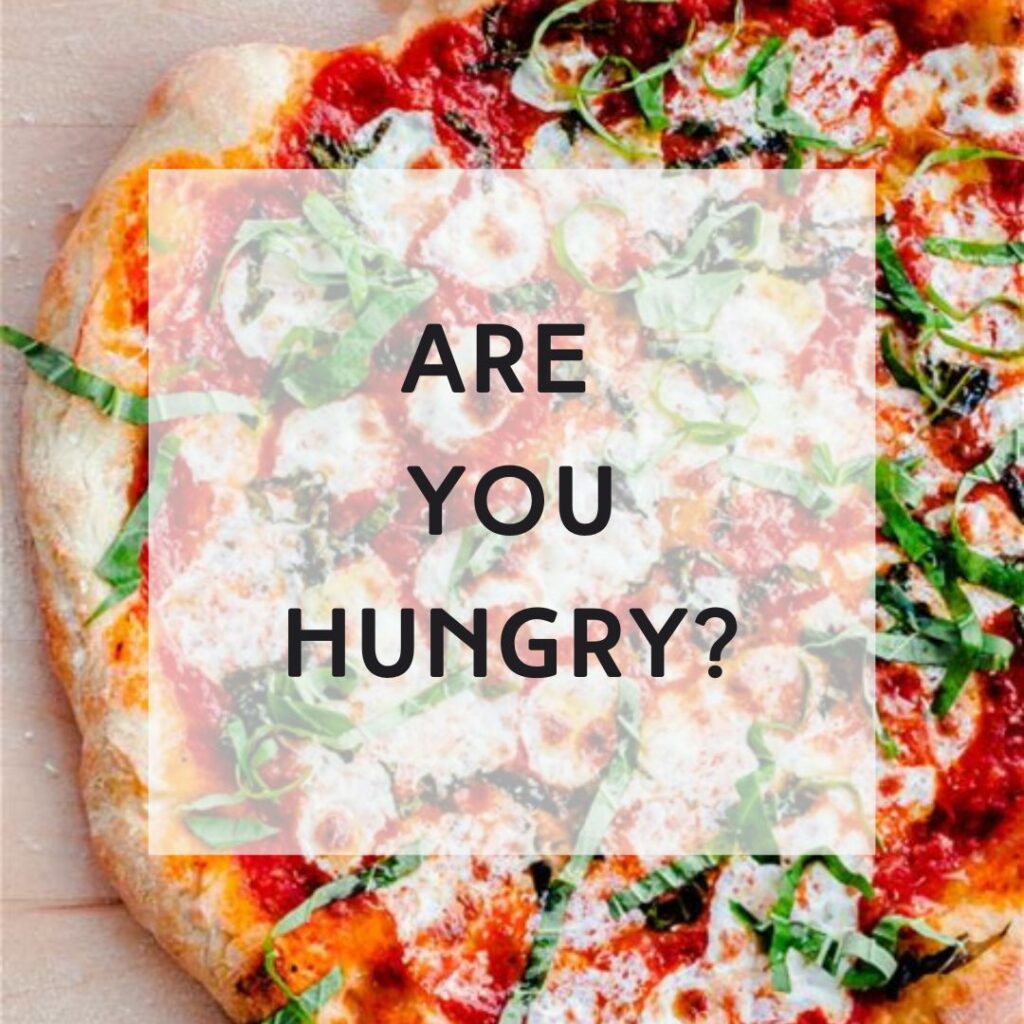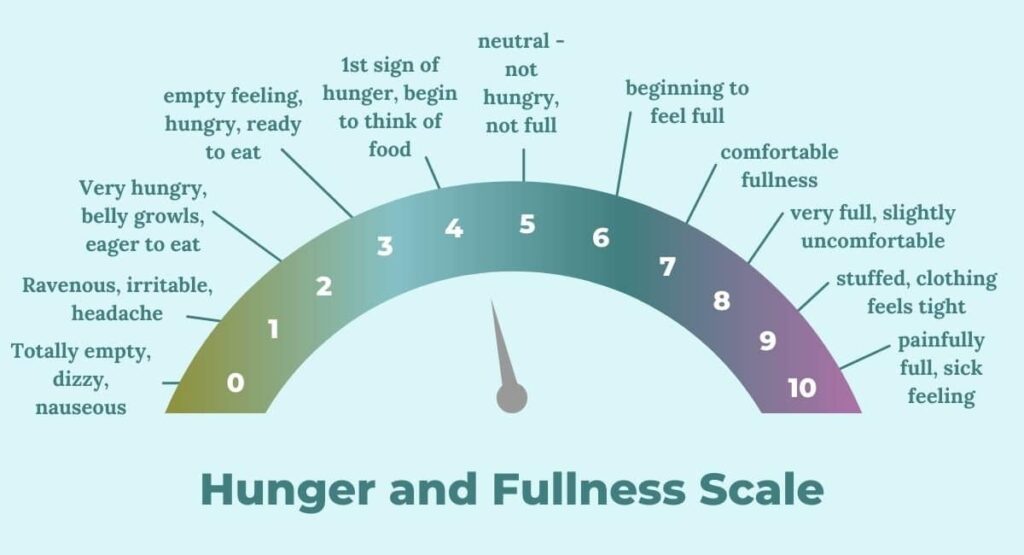
What is the first word or thought that comes to mind when you think of hunger?
For many hunger is seen as a nuisance, our body nagging us to do one more thing. For some hunger incites anxiety and fear. Many of the clients I talk with have gotten to the point, after years of ignoring it and pushing it aside, of not sensing hunger at all, a sure-fire sign that they are disconnected from their body.
Beginning to Honor Your Hunger
“Honor Your Hunger” is one of the ten principles of Intuitive Eating. It is something I spend a lot of time talking with clients about. A client recently had this to say after going through my Intuitive Eating course…”Having been a dieter for the past 60 years or so…I found a belief in my own body and its ability to fulfill its nutritional needs. Before this class I had no idea that my body had anything to say about my hunger. I believed it was all in my head.”
“Although many of us feel like with enough willpower we can be in full control of our body and it’s needs, many of its needs, including hunger, are actually controlled at a biological and cellular level.”
Our ideas around hunger have become skewed by the influence of diet culture. Hunger, at its most basic level, is a biological human response that physically and psychologically signals us to give our body energy. Although many of us feel like with enough willpower we can be in full control of our body and it’s needs, many of its needs, including hunger, are actually controlled at a biological and cellular level. Hunger is regulated by a symphony of sophisticated hormones and neurotransmitters that work in concert to ensure your body gets the nutrition and nourishment it requires for survival.
In our diet culture, we are trained to ignore this very basic signal our bodies and minds send us. We second-guess and often ignore our hunger either because we feel we “shouldn’t” be hungry because we “just ate” or we fear hunger because we dread making food decisions. We might also get into the trap of feeling like if we respond to hunger that is a direct path to overeating.
Many of us think hunger is “bad”, when in actuality it can be a sign of good health and your body just doing what it is supposed to do. We are born with the innate ability to feel hunger and in response to seek nourishment.
A quick google search can give you all sorts of diety tricks to ignore hunger, like chew gum, drink water, etc. in the end though ignoring our hunger only backfires leading us to allow ourselves to get so ravenous that we want to eat everything in sight. Sound familiar?
Tuning In
Our ability to recognize and interpret the physical sensations that arise from our body’s needs or emotions is called interoceptive awareness. Think about it, your body gives you lots of signals for its needs. It signals thirst with the sensation of a dry mouth; it might signal nervousness with the feeling of “butterflies in the stomach”, or sweaty palms; and low energy and a feeling of fatigue when we need sleep.
These are all examples of our body giving us signals for its needs and emotions. One of the most basic needs is the sensation of a full bladder when we have to go to the bathroom. Do you question that the way you do hunger? “No way I have to go again, I just went!” or “Maybe if I skip my trip to the bathroom this morning I will have to go less later.” Kind of absurd right?
“Do you question that the way you do hunger? ‘No way I have to go again, I just went!’ or ‘Maybe if I skip my trip to the bathroom this morning I will have to go less later.’ Kind of absurd right?”
We don’t question certain signals our body gives us, but we tend to not feel the same way about hunger, although it is a natural and necessary signal that our body needs nourishment. Somehow the very fundamental feeling of hunger has gotten vilified. Our body gives us clear signals around food and eating and hunger. We just need to be able to take a breath and notice it…and to let go of the fear around it.
The process of tuning in and listening is what mindfulness and mindful eating is all about. Slowing down for a moment and becoming more mindful can be hugely helpful in tuning in and identifying how hunger feels to us and how best to respond.
Obstacles to Feeling Hunger
Life and our eating experiences can create obstacles to noticing our body’s signals around hunger. If you are someone with a long history of dieting and listening to external rules, apps, diet gurus, and meal plans to tell you when and what to eat you may have to put forth a little more effort to retrain your body and mind. By always turning to external sources for this information we quiet and dull our own internal signals.
Living a very stressful and chaotic lifestyle, habitually eating in a distracted way (while watching TV, texting, scrolling social media), and skipping breakfast or other meals often, and always eating on a rigid schedule regardless of actual hunger can all also blunt our ability to feel hunger.
Noticing these signals and increasing our interoceptive awareness may be easier for some, but the good news is that with practice we can all retrain our bodies and minds to respond in a way that meets our basic needs.
Some clients are at the other end of the spectrum, where they always feel hungry. It is important in this instance to start with making sure you are getting enough food throughout the day. The amount of calories/food that we are told is appropriate in most weight loss diets, i.e.. the advice to eat a 1200 calorie diet, is simply not enough, leaving us only naturally feeling persistent hunger. Another important factor is making sure you are getting satisfaction from the food that you are eating – more on that topic in another blog soon.
What Does Hunger Feel Like For You?
Our bodies, if we are tuned in, are really good at letting us know what they need. In order to tune in we have to be able to check in with our minds and bodies and detect the signals it gives us. The first step to noticing hunger is to intentionally become more aware of when your body feels hungry and what that feels like for you. That may mean checking in periodically throughout the day.
You might practice just before you eat asking yourself “Am I hungry?” It can be helpful to pause, place your hand on your belly and take a couple of deep breaths to bring attention to your body. This can give you space to pause for a beat or two and notice, without judgement, whether there is a physical sensation of hunger. (Side note: True hunger and your body asking for nourishment/fuel is physical. It’s not a craving, a thought or a temptation.)
Interestingly, that physical sensation may feel different for each of us. We often make assumptions about what hunger feels like, only noticing certain hunger cues like a growling or gnawing in the stomach, but hunger can feel different from one person to the next or from day to day. It can be a growling stomach, but it can also be:
- irritability (aka “hanger”)
- a headache
- difficulty concentrating
- increased thoughts of food (yep, that’s not you obsessing about food, it may just be your body signaling hunger)
- low energy
- nausea or stomach pain
Most of us have no problem at all sensing the extremes of hunger and fullness, ranging from ravenous/I could eat a horse to Thanksgiving/food coma stuffed. Hunger and fullness are very much related.
When we wait to eat until we are ravenous, we feel so much urgency that our eating habits become quicker and more chaotic making us more likely to eat until we feel uncomfortably full and possibly to experience bloating, gas, and indigestion. This overly stuffed feeling causes us to feel guilty, and vow not to allow ourselves to eat so much next time.
“We make it a willpower issue, instead of what it is, just a not giving our body what it needs soon enough issue.”
It can be tougher to notice the in between gentler sensations for hunger. A helpful way to think about hunger and fullness is on a scale of 1 to 10, with 1 being running on empty or painfully hungry and 10 being that overly stuffed, miserable feeling. As you begin to tune in to what hunger feels like to you and asking “am I hungry?” try putting a number on that feeling.

The idea here is not to always be at a perfect point of hunger every time you eat, but instead just to notice what feels best for you and to become more aware. This can take some practice, but can really help to tune in if you have completely lost connection with what hunger feels like to you.
Wrap-Up
We live in a world that labels the body as an enemy to be controlled, instead of our very best friend that deserves care and respect. Instead of being critical or ignoring our body’s signals for what it needs, when we can slow down long enough to notice and reconnect with our body we can find that it tells us everything we need to know.
It is possible, with awareness, time, and patience to start to tune in to your body’s signals and for your body to become your ally, instead of your enemy. Hunger is one of the body’s most primal and fundamental needs and honoring it and responding to it is simply an act of basic self-care. When we respond to our body’s signals for hunger and listen to what it needs it is amazing how the body will respond.

0 Comments